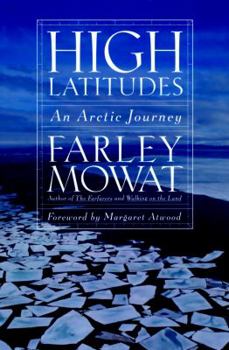High Latitudes: An Arctic Journey
Select Format
Select Condition 
Book Overview
Ideal for fans of Master a Million and Blue Latitudes Chronicles Mowat's hazardous 1966 journey across northern CanadaA must-have for wilderness loversFarley Mowat is a world-renowned author. More... This description may be from another edition of this product.
Format:Paperback
Language:English
ISBN:1586420615
ISBN13:9781586420611
Release Date:February 2003
Publisher:Steerforth Press
Length:300 Pages
Weight:0.95 lbs.
Dimensions:0.8" x 6.1" x 9.4"
Customer Reviews
2 ratings
Not seals, not whales, and not wolves... this time Mowat is an advocate for the "Eskimo"
Published by Thriftbooks.com User , 14 years ago
In 1966, writer Farley Mowat was sent east to west to explore the people and places of the Canadian Arctic. In 1993, he put this trip, and his tape recordings of the people he met, into this book. It is haunting. Sobering. Maddening. Saddening. It is a face of Canada's Far North that may never be recorded again. Mowat continues being the voice of the voiceless, the recorder of the unrecordable. I still need to read People of the Deer, which apparently has a similar theme. And Mowat pulls no punches... he picks on missionaries, government workers, and even native people that work to destroy a complicated, self-sustaining society. In addition, he tells the personal stories - sad, endearing, heroic - of many Inuit, in their own words. A few passages I want to remember: "The transmutation of beluga into gold was to be Whale Cove's first great industrial achievement" (p. 17). "He's a social anthropologist from some big university studying our habits. Those guys are everywhere in the north now, asking personal questions and busy taking notes like we was bugs for them to study. They crawl over us worse than lice" (p. 240; comments by Mary Carpenter). "You want to know what I got out of my twelve years' schooling? I lost my Eskimo language. I lost contact with my parents, with most of my brothers and sisters, with the old people who were my relatives. When I left Aklavik mission school they sent me to Yellowknife. That was even farther from home. After Grade 12 they finally let me go home to Sachs at last. That was the first time since I was five. I didn't know the place. I didn't know what to say or what to do. I didn't know my parents. I couldn't talk Eskimo no better than one of the white missionaries! But you know what was the worst thing of all? I didn't know who I was any more..." (p. 242; comments by Mary Carpenter). And the story of "Soosie E5-22" (chapters 18-21)... ah, the tragedy! Who else tells these stories? Farley Mowat is the Lorax... "I speak for the trees." This book has a short but enthusiastic introduction written by well-known writer Margaret Atwood: "High Latitudes gives us, with passion and insight, a vertical section of time past - the time that preceded our present. The choices that were made then affect our now, just as the choices we make now will determine the future. I'm sure Farley Mowat hopes that politicians today will be smarter than they were then, though he probably isn't betting on it" (p. xi).
A tragic topic, an impressive writer
Published by Thriftbooks.com User , 21 years ago
A sad book. High Latitudes focuses on the disintegrating culture of North Canadian Natives. Much of the book is transcription of the natives in their own words and gives excellent insight into their plight. An overriding theme of the book is the devastating effect bureaucratic decisions of government and big business has had on these Inuits (Eskimos) and others. This wasn't the adventure story I was expecting from Farley Mowat like "People of the Deer" in which he lived with an arctic community. This trip, taken in 1966, he travels by plane. Still none the less an adventure, he keenly describes a variety of northern communities including: Churchill ("a ...collection of mostly wooden structures between taiga and open tundra"), Povungnituk (the place that stinks), Old Crow (where "people catch lots of rats, won't let you go hungry there"), and many others. In typical fashion, Farley Mowat creates a gripping pathos about past cultures and events never to return, and often includes rich historical background for places he explores. If you're a Farley Mowat fan, I would rate this as important but not as engaging as some of his other books (I've read four others: "People of the Deer", "And No Birds Sang", "Never Cry Wolf", and "The Boat Who Wouldn't Float"). The book ends somewhat abruptly but he saves a great anecdote from the Yukon Territory for the end. A frustrating aspect about the events you read about in this book is that they took place in the sixties. I'd like to know how these settlements he visited have done since then. I'll probably never know.






